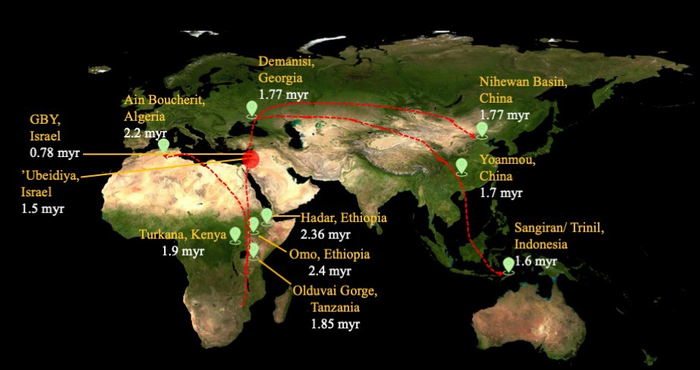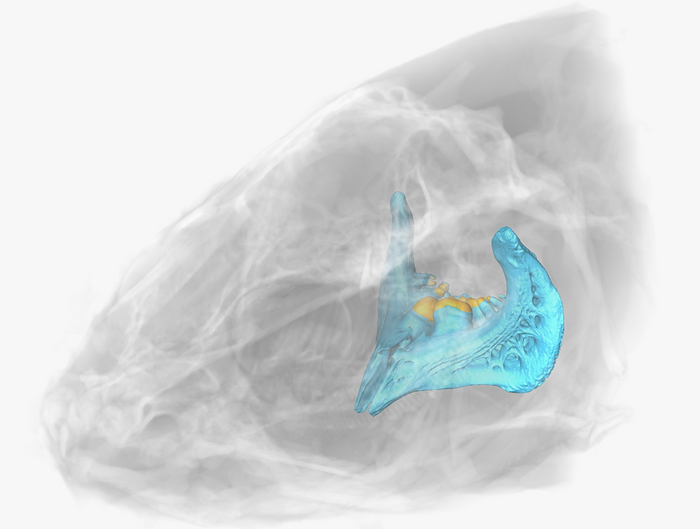Israeli Cuisine Is Much Older Than You Might Think
Migrating early hominins found abundant food in Israel, especially fish which contributed to brain development.

Credit: PsamatheM, Wikimedia Commons.
Researchers have found evidence that prehistoric people were cooking their food some 780,000 years ago, predating previous estimates by 600,000 years and the emergence of modern humans.
An analysis of a huge carp-like fish two meters (6.5 feet) long found at the Gesher Benot Ya’aqov site in Israel showed evidence of cooking, which is defined as the processing of food by controlling temperature at which it is heated through a range of methods.
A team led by Irit Zohar of Tel Aviv University and Naama Goren-Inbar of Hebrew University focused on the pharyngeal teeth used to crush hard food such as shelled molluscs. The teeth were found at different archaeological strata at the site in northern Israel.
By examining the structure of the crystals that form the teeth enamel (whose size increases through exposure to heat), the team proved that the fish caught at the now-absent Hula Lake, adjacent to the site, were exposed to cooking temperatures, and were not simply burned as refuse, for example.
The study showed how important fishing was to the diet and life of ancient peoples. For the first time, researchers could show which species were once present in the ancient lake and now extinct. “These species included giant barbs (carp like fish) that reached up to 2 meters in length,” Zohar said.
“The large quantity of fish remains found at the site proves their frequent consumption by early humans, who developed special cooking techniques. These new findings demonstrate not only the importance of freshwater habitats and the fish they contained for the sustenance of prehistoric man, but also illustrate prehistoric humans’ ability to control fire in order to cook food, and their understanding the benefits of cooking fish before eating it,” Zohar added.
Until now, evidence of the use of fire for cooking had been limited to sites that came into use much later than the Gesher Benot Ya’aqov (GBY) site by some 600,000 years, and which are associated with the emergence of Homo sapiens.

The team members believe that the region’s climate was wetter than it is now. Some lakes and freshwater areas have long since dried up and became deserts. But they once welcomed early humans migrating out of Africa. In ancient Israel, these migrants would have found drinking water and shallow lakes where they could catch fish and harvest nutritious food.
Other foods used by the ancient hominins included diverse plants, such as fruit, nuts, and seeds, as well as many large and medium-sized animals.
Fishing for food in freshwater habitats was the first step on prehistoric humans’ route out of Africa, assert the researchers. Early hominins began to eat fish around 2 million years ago, but cooking fish represented a revolution and offers further understanding of the relationship between early humans, their migration, and the local environment.
The oldest evidence of the use of fire in Eurasia was first identified by team-member Nira Alperson-Afil.

“The use of fire is a behavior that characterizes the entire continuum of settlement at the site,” she explained. “This affected the spatial organization of the site and the activity conducted there, which revolved around fireplaces.”
Alperson-Afil’s research of fire at the site was revolutionary for its time and showed that the use of fire began hundreds of thousands of years before previously thought.
Ancient hunter-gatherers settled and lived on the shores of Hula Lake for tens of thousands of years, as evidenced by the more than 20 settlement layers left by groups of hunter-gatherers on the shores of the ancient Hula Lake which lasted tens of thousands of years.
Tools made of basalt, flint, and limestone, made by the ancient hominins were found at the site.
Team members Guy Sisma-Ventura and Thomas Tütken analyzed the isotope composition of oxygen and carbon in the enamel of the fishes’ teeth, which allowed them to reconstruct the ancient lake’s condition throughout the seasons. They determined that fish were not merely a seasonal source of food but were exploited throughout the year, thereby reducing the need for migration.

X-ray of modern carp with jaw and pharyngeal teeth emphasized. Credit: Tel Aviv University.
Goren-Inbar said that the find shows that hominins were cooking and eating fish for thousands of years continuously at the same place. “This is another in a series of discoveries relating to the high cognitive capabilities of the Acheulean hunter-gatherers who were active in the ancient Hula Valley region. These groups were deeply familiar with their environment and the various resources it offered them,” the researcher said.
Acheulean refers to the characteristically oval and pear-shaped stone hand-axes used by Homo erectus – an ancestor of modern Homo sapiens -- that were originally found at the Saint-Acheul site in northern France. Homo erectus entered the paleontological record some 2 million years ago in Africa. Thereafter, the proto-human species spread throughout much of the world before dying out in Indonesia approximately 170,000 years ago. Homo erectus is believed to be an ancestor of Homo sapiens, which is believed to have emerged 300,000 years ago.
The transition from eating raw food to cooked food had dramatic implications for human development because eating cooked food reduces the bodily energy required for digestion, thus promoting the development of other physical systems. Changes included those in the human jaw and skull, freeing early humans from the intensive work of searching for and digesting raw food.
Cooked food provided more time to explore new social and behavioral systems, while some scientists believe eating fish was an important mile-marker in human cognitive evolution and the development of the brain. They claim that eating fish is what made us human. It is widely known today that fish contain omega-3 fatty acids, zinc, and iodine, which contribute greatly to brain development.
Their study appeared in the journal Nature.
Martin Barillas is the author of Shaken Earth, available at Amazon.